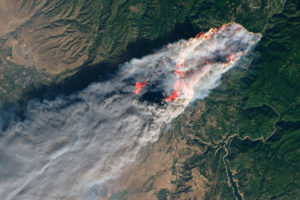Emergency alerts during California’s Camp Fire highlight reliance on fragile communication systems
California’s deadliest and most destructive wildfire in history, the Camp Fire, was fully contained on Sunday, November 25, after burning for more than two weeks through 153,000 acres in Northern California’s Butte County. The blaze devastated the town of Paradise, and killed at least 85 with hundreds still unaccounted for. The Woolsey Fire, which ignited on the same day according to Cal Fire, simultaneously tore through more than 90,000 acres in Southern California, killing three, before being contained last Wednesday.
As the nation contemplates how to be more resilient to wildfires to prevent such devastation in the future, two critical aspects for attention are emergency alerts and evacuation planning.

Paradise, in comparison to other cities in the US, was relatively prepared for disaster. It uses an emergency phone notification system and has a detailed evacuation plan dividing the town into zones for staggered evacuations. In 2016, the town had a two hour practice evacuation, distributed evacuation zone maps, and rehearsed a phone communication center.
But despite the city’s relative preparedness, there were still ways in which emergency planning fell short. For one, the city’s emergency alert system for notifications were voluntary opt-in, meaning that residents needed to sign up to receive alerts. Only about a quarter of the town’s 26,000 residents had opted in. Some residents criticized the local government for not putting out a citywide Amber Alert-style evacuation order that would broadcast to all cell phones, televisions, and radios. The city reportedly did not issue this kind of alert because it initially wanted to stagger evacuations zone by zone to avoid clogging the roads. Congestion on the roads not only makes evacuations slower, but can cause more risk — it only takes one vehicle stalled without fuel or one fallen tree to create a bottleneck or jam on the roads.
Responding to these criticisms, the Butte County Sheriff said a total of 5,227 notifications were sent by email, 25,643 to land lines and cell phones and 5,445 by text message, and cited the swiftness of the fire as one of the major challenges in getting more out.
“We were trying to move tens of thousands of people out of an area very rapidly with the fire coming very rapidly,” Butte County Sheriff Kory L. Honea said at a news conference five days after the fire. “And no matter what your plan is to do that, no plan will ever work 100 percent when you are dealing with that much chaos.”
However, even if there is an alert system in place, most systems rely on cell towers and power supply to those cell sites. In some locations in Paradise, cell service is unreliable. According to some residents, cell service for both AT&T and Verizon was lost around 10:15 am the day of the fire, while evacuation orders were issued between 8:03 am and 1:37 pm depending on the location. Many residents reportedly evacuated only after neighbors came knocking on doors.
While a new state law grants counties greater authority over emergency alerts, such as requiring voluntary opt-outs instead of opt-ins, some disaster preparedness experts recommend more than just universal mobile alerts, suggesting audible alarms and sirens with lights. Jane Mobley, who co-authored a paper on natural disaster response for the National Academies of Sciences told the Mercury News, “If I thought I saw a glow of orange, I would not go to my computer to look at Twitter… Here in Kansas, when you hear the sirens, you take cover.”
Sources and Further Readings
The deadliest, most destructive wildfire in California’s history has finally been contained – The Washington Post
With 1 California Fire Contained, Survivors Find Rays of Hope Amid the Horror – NPR
Camp Fire: Paradise residents say they received no mass cellphone alerts to evacuate, or to warn of fires – The Mercury News
Lessons from Camp Fire: Staying alive in California fire country – The Mercury News
Paradise Fire survivors say warnings were too little, too late – NBC News
